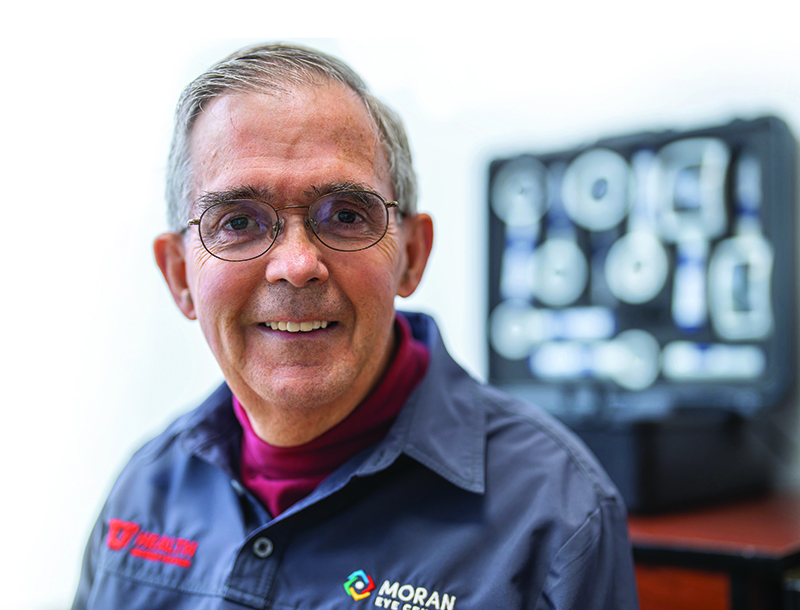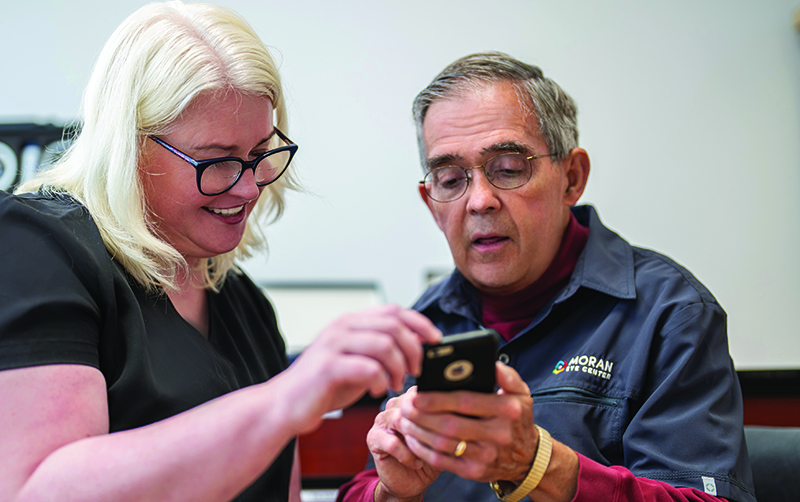Breadcrumb

The first thing Robert M. Christiansen, MD, a board-certified ophthalmologist, will tell you about his profession is that he loves it.
"My work is all about hope," says Christiansen, the vision rehabilitation specialist for the John A. Moran Eye Center's nationally renowned Patient Support Program. "We are here to improve the quality of life for people with low vision. What's better than that?"
Christiansen uses the term "low vision" to describe eye impairment that can't be fixed with standard eyeglasses, contacts, medication, or surgery. Low vision, caused by incurable eye disease or aging, can make everyday activities such as reading, cooking, or shopping a challenge.
Yet, Christiansen points out, just as patients expect physical rehabilitation after heart or knee surgery, people with low vision can go through rehab for lost or compromised vision. Drawing upon more than 40 years of experience, Christiansen combines practicality and technical finesse to find ways to help patients with low vision continue doing what they want to do.
For patient Eric Handman, a University of Utah School of Dance faculty member, that meant being able to make the most of the low-vision apps and helpful features available on a smartphone.
"My vision is 20/80, so it's a disability, though I never wanted to admit that," says Handman. "But it never feels like a disability when I'm in Dr. Christiansen's office. He has had a direct and very positive effect on my quality of life and what I can do, and it affects how our whole family lives and functions."

Motivated by Compassion
Christiansen learned about vision rehabilitation as a specialty during his ophthalmology residency training at what is now the California Pacific Medical Center in San Francisco.
"I was drawn to the specialty because I truly feel compassion for people who have compromised vision," he said. "There is always something we can do. If I can provide a means for them to see better and continue their lives, that's a great feeling for them—and for me, even if they have to make some big adjustments."
Christiansen says his work always begins with listening to his patients. He takes a good hour to learn about their situation, challenges, and concerns about vision loss. This interview is the longest time many patients have spent discussing themselves and their challenges with a physician.
Next, a session moves to the technical side of things. Christiansen does an extensive refraction exam, spending up to 25 minutes using a phoropter, the ophthalmologist’s tool for finding the perfect lens or combination of lenses for a patient’s eyeglasses or contacts.
"If we can go from 20/80 to 20/60, that’s a significant improvement. From 20/70 to 20/40 means they can drive again, and that’s an incredible thing. It also means they can read menus posted on walls—that’s something most don’t realize is a challenge for many people struggling with distance vision," he says.
When improving close-up vision, Christiansen works directly with Moran’s optical shop to make super high-powered bifocals. "People may only be able to read a word at a time when looking at enlarged letters, but they catch on quickly," he explains.
Beyond glasses, Christiansen says, "We live in a time of wonderful innovations: magnifiers with LED lights that last forever, telescopes for distance vision, closed-circuit TVs that read the newspaper to you, and of course all the advantages of computers with talking text and smartphones. There are cell phones designed for people with vision impairment."
One of the most prevalent eye diseases among Christiansen's patients is age-related macular degeneration (AMD).
"Very few people lose all vision from AMD. Because it only affects central vision, they usually maintain some peripheral vision, and we can help them make the most of that," says Christiansen. "Still, they may feel some depression and worry about it, and that is understandable. But, I tell them they can handle it and that I'm going to be their BFF ("Best Friend Forever") who will do everything I can to help them stay in their homes, see their grandchildren, see pictures, and use their phones. Our goal is to stay positive."
"There's always hope when we can provide the means to see better and help people continue their lives with the right adjustments."
Robert M. Christiansen, MD
Lifelong Caring
Moran’s Patient Support Program, directed by Lisa Ord, PhD, LCSW, includes support groups, counseling, and an occupational therapist. The program conducts home visits to assess needs and help with solutions in a patient’s environment—whether it’s the kitchen or an art studio.
The program is unique in the Mountain West and one of a handful nationwide.
Patients involved with the program and Christiansen say the care he provides means the world to them.
"I didn't realize there was such a thing as actual 'low vision' until I met with Dr. Christiansen when I was 14 years old," says Janna Finerfrock, now in her 40s, who was born with conditions severely affecting her vision. "He has helped me every step of the way, encouraging me to focus on what I can do, giving me the confidence to move ahead.
"Between contact lenses and magnifying glasses, which I wear together, I ended up being able to drive, graduate from college, and teach second grade for 19 years."
In addition to decades of teaching, publishing, and serving on community boards involved in vision rehabilitation, Christiansen has volunteered as an ophthalmologist with Latter-day Saint Charities in over 25 countries. He serves as chairman of the Utah Ophthalmology Society and has been recognized on state and national levels for his service to the partially sighted.
"Dr. Christiansen has made a difference in the lives of countless patients," says Ord. "His skills are beyond compare. On top of that, he brings patience, kindness, and a positive attitude to every situation he encounters."